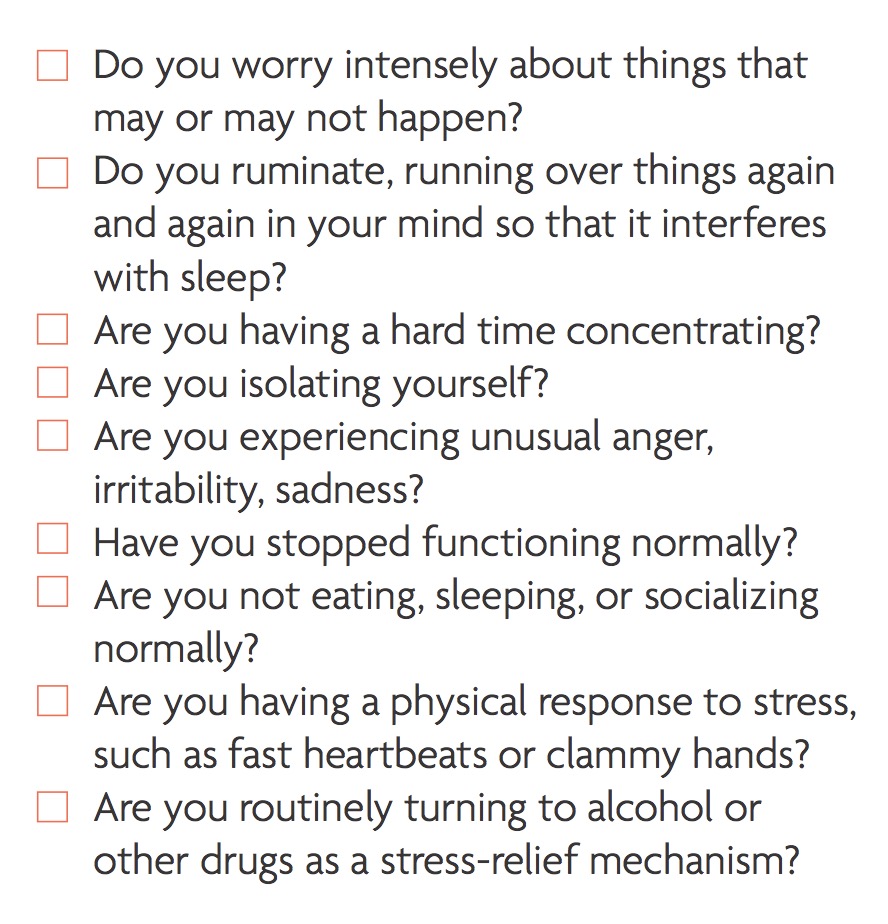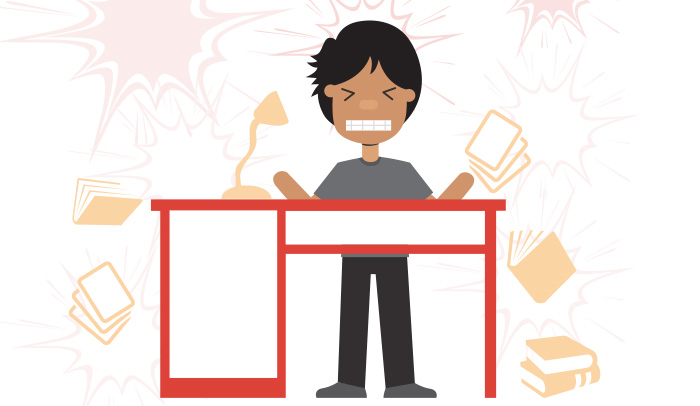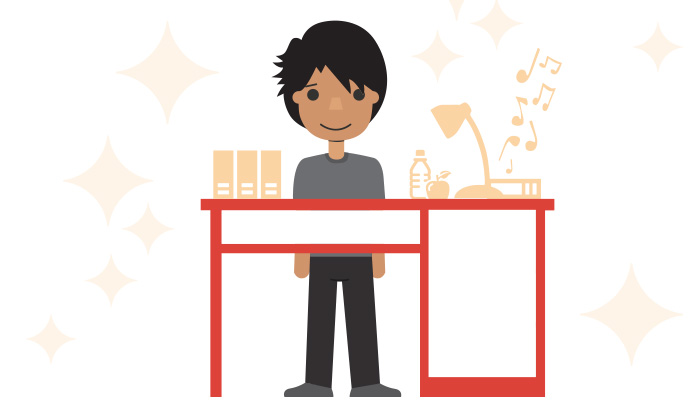Reading Time: 8 minutesRate this article and enter to win
You’re heading toward an epic bio exam, that history lit review isn’t going to write itself, and the student government meeting lasted forever because the phantom glitter-bomber is still on the loose in the res halls. Stress is a low-key word for what you’re feeling. What you could use right now is a metaphorical bag of stress-relief techniques, with options that cover every cortisol-overload scenario, as well as strategies for preventing the angst from building up in the first place. So—start packing one.
“People who are successful at reducing the negative effects of stress have a variety of tried-and-true techniques. This helps keep their techniques effective over time, and covers different environments and situations,” says Steve Lux, senior health educator at Northern Illinois University.
Check out our sample stress bag below. Take each category (for example, physical activity) and think about your fix of choice. You’re not limited to the categories shown here. Just make sure your bag includes a variety of stress-reduction strategies, so you always have something that works, whether you’re indoors or outdoors, at whatever time of the year, for no (or a low) cost, that addresses your physical or emotional needs (or both).
Quiz: Is there too much stress in your life?
 Example
Example
Immediate stress fix: Check out Jimmy Fallon’s YouTube channel
Stress prevention: Regular feel-good movie date with friends
Why it works
Making time for fun and laughter is a legit act of self-care. Laughter and joy release endorphins (your brain’s feel-good chemicals) and are associated with lower levels of stress hormones. Even the anticipation of a good joke can start to lower stress hormones, according to a 2008 study in the Journal of the Federation of American Societies for Experimental Biology.
Find your laughs
We don’t need to tell you that quick laughs are available free all over the interwebs. The trick is learning to enjoy BuzzFeed, The Onion, and The Office without getting sucked into social media drama or the comments sections (not saying this is easy).
As a rule, prioritize laughter. Funny friends. Live comedy shows. Or how about mini-golf? That’s a reliable source of hilarity.

Example
Immediate fix: Download an upbeat song
Prevention: Create an emergency stress-reducing playlist
Why it works
Uplifting music can improve well-being and liveliness, reduce stress-related hormones, and alleviate feelings of depression, according to a 2003 study in the Journal of Music Therapy. In a CampusWell survey, over 70 percent of respondents identified listening to certain songs or music as a quick fix for stress.
Make a no-stress playlist
Find songs for your stress bag that make it impossible to feel blah (try “Walking on Sunshine” by Katrina and the Waves, “Pocketful of Sunshine,” by Natasha Bedingfield, or “Happy” by Pharrell Williams).
Music you love or that makes you get moving provides immediate stress relief. Don’t hold back from singing along, which can also temper your stress. Mix up your music with ideas from Pandora or Spotify, dig into iTunes, or ask some friends if you can take a look at their music library.

Example
Immediate stress fix: Click through photos of awesome experiences
Stress prevention: Write down three happy moments each week
Why it works
Positive experiences are opportunities to identify and build our inner strength and resilience. Our experiences drive our brain development, so it makes sense to find ways for our happy experiences to have the most lasting impact. Nurturing positive memories is a great way to discover your strengths and how you can use them to overcome challenges.
Figure out which memory triggers work for you. Maybe keep your happiest photos where you can see them, save supportive emails or calming quotations to reread when you’re under pressure, or keep a gratitude journal. Try writing down positive experiences, including why they happened, what they mean to you, and how you can have more of them. (This exercise was developed by researchers at the Penn Resilience Project, University of Pennsylvania.)
HEAL yourself
To further empower yourself through positive experiences, try the HEAL system identified by Dr. Rick Hanson, a neuroscientist at the University of California Berkeley.
H Have a good experience: For example, celebrate a friend’s birthday.
E Enrich it for about 20 seconds, re-imagine the venue, the food, the cake, the joke. This consolidates your long-term memory of the event.
A Absorb it. Focusing on the experience encodes it into your neural structure.
L Link positive and negative experiences: Allow the positive feelings to take the edge off negative memories and heal old pain.
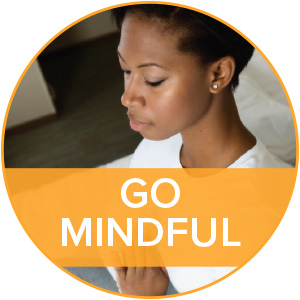
Example
Immediate fix: Take a study break and use the Headspace app
Prevention: Schedule 10 minutes of mindfulness each morning
Why it works
The Headspace app provides guided meditation and mindfulness techniques, which can ease stress. Mindfulness and meditation are powerful tools for reducing stress hormones and boosting emotional resilience in demanding situations. Practicing mindfulness for 10 minutes a day—for just a week—results in better sleep, less stress, and greater self-compassion, according to research.
“Mindfulness has been identified as one of the primary ways to develop resilience in college students,” says Dr. Holly Rogers, a psychiatrist at Duke University, North Carolina, and founder of the Koru Mindfulness program for college students.
How you can be mindful
Here’s a quick fix for your stress bag from Dr. Rogers: “Use your senses to help pull your attention back into the present moment. Count five things you can see. Then five things you can hear. Five things you can feel or touch. Bring your full awareness to carefully checking in with each of your senses.”
Koru Mindfulness

Example
Immediate stress fix: Track down the textbook and read a few pages
Stress prevention: Start every day with a small, productive task
Why it works
Time management is key to college life, and falling behind with academic assignments can be a major stressor. That’s why it’s worth getting in the habit of “cracking the door” on each new assignment. From that point on, you’re not starting from scratch, and the project is less intimidating.
“Cracking the door” means immediately doing a small assignment-related task. Think about ways you can approach this, such as breaking the assignment into smaller pieces and putting that series of deadlines on your calendar, or getting the crucial book and reading a few pages.
“Even if the progress is a small win, something that looks incremental, almost trivial, it can provide a tremendous boost to people’s intrinsic motivation and positive emotions. Creativity and productivity feed on each other,” said Teresa Amabile, professor of business administration at Harvard Business School and co-author of The Progress Principle (Harvard Business Review Press, 2011) (quoted in a Toronto publication).
Start each day with a small win
Keep a list of small tasks that feel valuable and productive to you. First thing each morning, do one of them. For example:
— Laundry
— Call Dad
— 10-minute mindfulness practice
— Make my bed

Example
Immediate stress fix: Take a campus stroll
Stress prevention: Round up your friends and get outdoors
Why it works
Physical activity in natural environments is associated with lower blood pressure, increased self-esteem, and improved mood, according to a 2005 study in the International Journal of Environmental Health Research. “I take one day to be with nature each week. It gives me a weekly reward to motivate me to do my work,” said Anastasia Z., a recent graduate of Metropolitan State University of Denver, Colorado, in a CampusWell survey.
Find your nature thing and put it in the bag. If you don’t do trails and wilderness, sprawl on a manicured lawn or stroll through a botanical garden like a 19th-century socialite.
Bring your friends along
Seriously, never miss a chance to get out there. Walking in nature with friends increases our mental well-being and reduces the effects of stressful events, according to a 2014 study in Ecopsychology. Recruit your buddies for a hike, borrow a dog from the rescue center, bike through a local park, take your yoga practice outdoors, or splash out (sorry) for a kayak rental. Cold winter? Build a snowprofessor. Stomp through the slush and admire the crystalline branches. For more time in nature, see if anyone’s down for a creatively inexpensive weekend getaway, or go yourself; also try a road trip to see a friend, a slumber party, or baking cookies while dancing to ’70s disco tracks
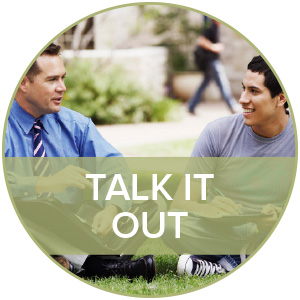
Example
Immediate fix: Seek out a friend, RA, or counselor
Preventive fix: Al-Anon meetings twice a week
Why it works
A huge body of evidence makes clear that social support reduces our stress and improves our health. Emotional support helps minimize our physiological responses to stress, such as a sudden rise in blood pressure and the release of stress hormones, according to the American Institute of Stress.
Find support in company
Again, it’s about knowing what works for you, identifying approaches you’d like to try, and sticking them in your stress bag. Consider these options:
- Mentors: If your college doesn’t have a formal program, ask your advisors, faculty, RAs, and upperclassmen for connections.
- Friends and family: Students who spent more time with their family and friends experience less stress, according to 1997 study in the Journal of Youth and Adolescence.
- Counselors: Counseling centers on campus provide free, confidential services.
- Places of worship or spiritual counselors: You may find relief in the rituals and social support of a church, temple, mosque, or chaplain’s office. A 2013 analysis of multiple studies highlighted the therapeutic value of prayer and meditation in improving well-being and relieving anxiety, stress, and depression.
- Support groups: For example, Alcoholics Anonymous is widely available for people dealing with addiction, and Al-Anon for the family and friends of people dealing with addiction. Also look for groups representing your student community (e.g., international, first-generation, or LGBTQ students).
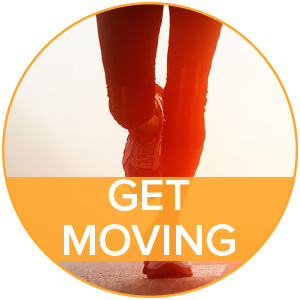
Example
Immediate stress fix: Rock out in your room to Ke$ha
Stress prevention: Take a weekly hip-hop class
Why it works
Most types of physical activity can alleviate stress and anxiety. After exercise, we’re more likely to feel energized and confident enough to tackle the stuff we find difficult.
For example, in a survey by Student Health 101, more than one in three respondents said they had danced to relieve their stress. Dance is therapeutic, emotionally and mentally as well as physically. It involves a complex combination of systems in our bodies and brains—motor skills, coordination, rhythm, synchronization, and so on—according to a 2006 study of dancers’ neural activity (Cerebral Cortex). This may help explain its multiple benefits.
Any activity will do—if you’ll do it
For your bag, identify realistic ways you can get moving in any weather or season, and for varying lengths of time (five minutes to a couple of hours). Run up and down stairs a few times, walk across campus, or see what’s going on at the rec center. Maybe one of these has your name written all over it: CrossFit, ballet barre-inspired classes, Zumba, TRX training, or slide boards.
Get help or find out more
[survey_plugin]
Article sources
Steve Lux, MS, former senior health educator, Northern Illinois University, DeKalb.
American Institute of Stress. (n.d.). [Website.] https://www.stress.org/
Berk, S. L., Tan, A. S., & Berk, D. (2008). Cortisol and catecholiamine stress hormone decrease is associated with behavior of perceptual anticipation of mindful laughter. Journal of the Federation of American Societies for Experimental Biology, 946(111). Retrieved from https://www.fasebj.org/cgi/content/meeting_abstract/22/1_MeetingAbstracts/946.11.
Brown, S., Martinez, M.J., & Parsons, L.M. (2006). The neural basis of human dance. Cerebral Cortex, 16, 1157–1167.
Marselle, M. R., Irvine, K. N., & Warber, S.L. (2014). Examining group walks in nature and multiple aspects of well-being: A large-scale study. Ecopsychology, 6(3), 134–147.
Murcia, C.Q., Bongard, S., & Kreutz, G. (2009). Emotional and neurohumoral responses to dancing Tango Argentino: The effects of music and partner. Music and Medicine, 1(1), 14. Retrieved from https://mmd.sagepub.com/content/1/1/14.short
Hirokawa, E., & Ohira, H. (2003). The effects of music listening after a stressful task on immune functions, neuroendocrine responses, and emotional states in college students. Journal of Music Therapy, 40(3), 189–211.
Pretty, J., Peacock, J., Sellens, M., & Griffin, M. (2005). The mental and physical health outcomes of green exercise. International Journal of Environmental Health Research, 15(5), 319–337.
Student Health 101 survey, July 2015.
 Pablo N., second-year graduate student, Memorial University of Newfoundland, Newfoundland and Labrador
Pablo N., second-year graduate student, Memorial University of Newfoundland, Newfoundland and Labrador ![]()
![]()
![]()







